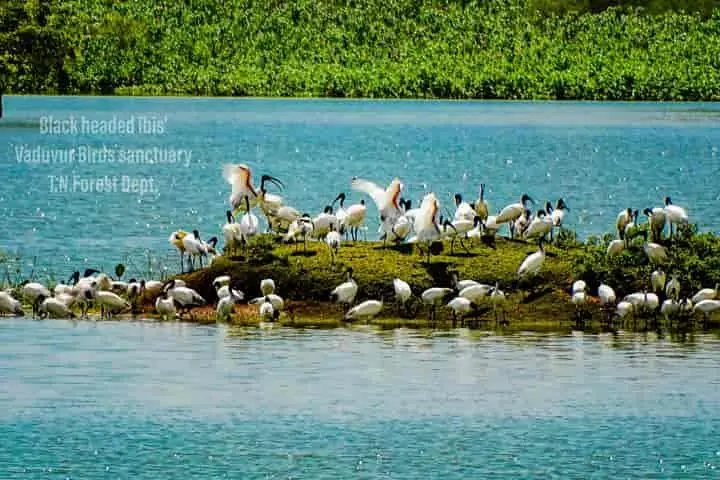Making the 75 years of India’s Independence special, the Union Ministry of Environment, Forest and Climate Change has added 11 more wetlands to the existing list of 64 to the Ramsar sites. With this the total area covered by these sites now becomes 13,26,677 hectares.
Of the new sites, Tamil Nadu has four while Odisha 3, Jammu and Kashmir 2 and Maharashtra and Madhya Pradesh one each.
Declaring these sites as Ramsar helps in conservation and management of wetlands and proper use of their resources. The Ramsar Convention came into being in 1971 at Ramsar, Iran and India became a signatory on February 1, 1982.
With this latest addition, Tamil Nadu has maximum number of sites, 14 followed by Uttar Pradesh at 10
Tamil Nadu

Vaduvur Bird Sanctuary
This large human-made irrigation tank provides shelter for migratory birds as it provides a suitable environment for food, shelter, and breeding ground. Among the birds found here are Indian Pond Heron Ardeola grayii and also waterfowl such as Eurasian Wigeon Anas penelope, Northern Pintail Anas acuta, and Garganey Anas querquedula.

Chitrangudi Bird Sanctuary
Located in Ramanathapuram district, this wetland has been a protected area since 1989 and declared as Bird Sanctuary. It is ideal for winter migratory birds. Around 50 birds belonging to 30 families have been reported from the site and of this 47 are water birds and 3 terrestrial birds. Among the notable birds spotted here are spot-billed pelican, little egret, grey heron, large egret, open billed stork, purple, and pond herons.

Suchindram Theroor Wetland Complex
As part of the Suchindram-Theroor Manakudi Conservation Reserve this wetland attracts thousands of birds every year. Around 250 species of birds have been recorded in the area, of which 53 are migratory, 12 endemic, and 4 threatened.
Kanjirankulam Bird Sanctuary
This sanctuary is located near Mudukulathur Ramanathapuram district and is a notable nesting site for several migratory heron species like painted stork, white ibis, black ibis, little egret, great egret and the threatened Spot-billed Pelican Pelecanus philippensis. Many globally near-threatened species like Spot-billed Pelican, Oriental Darter, Oriental white Ibis and Painted Stork and commonly occurring shore and water birds like greenshank, plovers, stilts and forest birds like bee-eaters, bulbuls, cuckoos, starlings, barbets, have been sighted here.
Odisha

Tampara Lake
One of the most prominent freshwater lakes in the State, it is situated in Ganjam district. It supports at least 60 species of birds, 46 species of fishes, at least 48 species of phytoplanktons, and more than seven species of terrestrial plants and macrophytes. It is habitat to vulnerable species like Cyprinus carpio, common pochard and river tern.

Hirakud Reservoir
The largest earthen dam in the State, the reservoir started operating in 1957. It supports a wide range of floral and faunal species, including several of high conservation significance. Among the 54 species in the reservoir, one has been classed as endangered, six near threatened and 21 fish species of economic importance. More than 130 bird species have been recorded at this site, out of which 20 species are of high conservation significance.

Ansupa Lake
The largest lake of Odisha, Ansupa is located in Cuttack district’s Banki subdivision. It is formed as an oxbow lake formed by River Mahanadi and is home to 194 species of birds, 61 species of fishes and 26 species of mammals in addition to 244 species of macrophytes. It is a safe habitat for three threatened bird species — Rynchops albicollis, Sterna acuticauda and Sterna aurantia and also three threatened fish species, namely, Clarias magur, Cyprinus carpio and Wallago attu.
Jammu and Kashmir

Hygam Wetland Conservation Reserve
Hygam Wetland falls within the Jhelum River basin and is located in the Baramulla district. It provides a plethora of ecosystem services, including fish and fibre, water supply, water purification, climate regulation, flood regulation, and recreational opportunities.

Shallbugh Wetland Conservation Reserve
Located in Srinagar district this wetland serves as an abode to more than four lakh resident and migratory birds of at least 21 species. Shallabugh Wetland plays a major role in the natural control, amelioration or prevention of flooding, and also as an important breeding ground for many species of waterbirds
Madhya Pradesh

Yashwant Sagar
This wetland is an important bird area and is considered to be a stronghold of the vulnerable Sarus Crane in central India. Its backwaters have shallow areas which are suitable for waders and other waterfowl.
Maharashtra

Thane Creek
Thane Creek is fringed by mangroves on both banks and has 20 per cent of the total Indian mangrove species. It is an important part of the wetland complex of the Central Asian Flyway. It boasts of 202 avifaunal species, 18 species of fishes, crustaceans and molluscs, 59 species of butterflies, 67 species of Insects, and 35 species of phytoplankton, and 24 species of zooplankton and 23 species of Benthos.
Also read: India equals China in protecting wetlands after adding 10 new sites




















